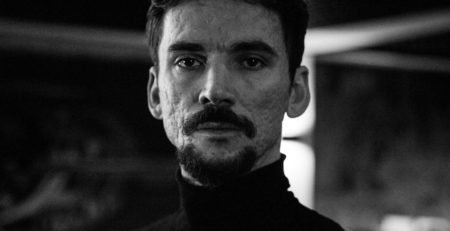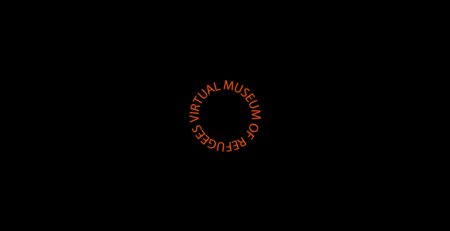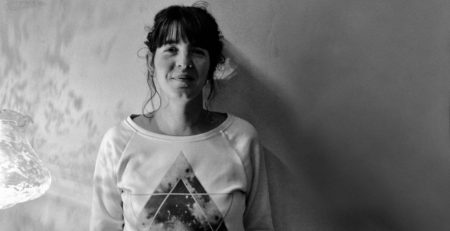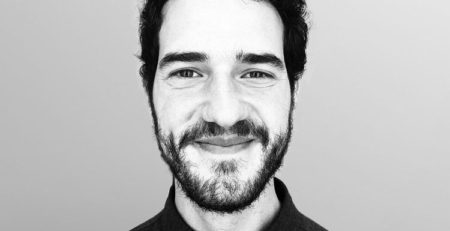Anonymous
R.B.: Hi! Let’s start with the beginning of the war. Were you working? What were you doing at that time until you decided to leave?
A: Before the war, I worked until March 25. On March 25, that is one night before the bombings, according to the agreement we made with my friends to keep our jobs, I had to keep my promise, so as usually I went to the bus that took us to work. There were only two Albanians at the bus station: it was me from the Power Plant, and another one from a KEK department. When the Power Plant bus arrived, the driver came to the door and said, “No Albanian can get in the bus.” I didn’t try to get in. The other colleague tried but a Serbian guard of KEK told the driver he was Albanian and he made him get off. So I decided to return home. I came home, I called my friends at work, because we had a telephone at home, and I told them I couldn’t go to work because the driver took me out of the buss. They informed the senior managers that I couldn’t go to work because the driver didn’t let us in the bus. My daughter burned her hand with hot water a day earlier, and my wife suggested we took her to the doctor because out of fear that it’d turn into a scar. I accepted. We got ready, and left. When we went to the main street in Fushe Kosova, at the crossroad, which is now a roundabout. There were groups of paramilitaries wearing red hats on the three sides. On the side closest to me, apart from the paramilitaries, there were many young Serbs talking to the paramilitaries. When I saw the paramilitaries, I couldn’t go back because they were following me, and I told my wife, “We can’t go back now, may God help us because we’re in danger!” When we got closer to the first group of paramilitaries, where the crowd of young Serbian civilians was, their superior ordered his workers to check us. At that moment, a young Serb, who was our neighbor, turned his head and saw me. He knew us because we were neighbors. And he told him “He’s from here.” The paramilitary superior revoked his order and they didn’t check me. So I got in my car and drove off to the hospital. Since the first one let us go, the other two groups didn’t react at all and we went to the hospital. There was a tense situation in the hospital, Serbian music was playing. It was full of Serbian reservists. We went to one of the rooms, and the nurse had a very intimidating tone. Otherwise, she had been very polite before. When she was done, I asked her, “Should we come back tomorrow to clean the wound?” She yelled at me and said, “Go home! There is no tomorrow!” We returned home, but we went another way because I couldn’t go back by the paramilitaries at the crossroad again. I went another way, by the church, by the school which led to the main road. I couldn’t avoid the main road. When we went by the school, we saw the school yard was full of reservists but no one reacted there. We went to the main road. The paramilitary groups were still in the same positions. We turned onto the left side of the ride, on the side of my house, and we were walking on the pavement. When we got close to the book shop, a girl who was our neighbor was one road ahead of us. She bit her lip when she us with our daughter, because she knew us. She came to us and started walking with us; she put me with my daughter in the middle, my wife on one side, her on the other. Now, there’s a distance of 50 meters between those two roads. She kept caressing my daughter who was 21 months old then all the way home. The paramilitaries kept looking at us because we were now 20 meters close to them. But our neighbor went to the paramilitaries and we went our way and no one said anything. This was on Thursday, March 25 1999.
When we returned home, we went on with some work on the garden because we were growing a garden then. I called my friends again and I told them what happened to me. They told me our boss had gone to Prishtina to get a special permit for us because we were essential KEK workers. So I was waiting for the permit because all of us Albanians had made a deal to go to work to guard the building. After a while, my boss, who was Albanian, called me directly and said that he couldn’t get a permit. He said “We can only hope for the best now… we may not be able to go to work anymore.” And I didn’t go anymore. In the evening of March 25, they started burning the houses. On the front side, they started burning the shops as soon as the bombings started. They were stealing and burning the shops owned by Albanians, if they didn’t need them for their own needs. Now, on the 25th, they started burning the houses in the evening. However, we were surrounded by Serbs in our neighborhood. We had an acre of land with our cousins, the rest belonged to Serbs. They didn’t do anything to us that night. The day after that, so on Friday the 26th, we worked on the garden again, planting some trees and vegetables. That day they broke the windows of an uninhabited house that belonged to some of our Albanian neighbors, the only one we had. My brother said, “You can’t sleep here tonight because they broke their windows, they’re going to burn it down and you’ll be in danger too”. And we decided to send the children and women at my brother’s. My parents didn’t want to leave, they stayed. My youngest brother and I did too. They stayed in the lower floor, I stayed in the upper floor to observe. Houses were getting burned down on all sides. Around 12 am, they fired at the roof of a neighbor’s house about 50 meters away from mine. Right after that, another neighbor’s house and, after a minute or so, they shot fire at our house too. They fired at the roof and second floor. When I heard the first bullet hit the roof, I laid down on the floor. They fired at the windows too, I mean the second floor windows. I stayed laying on the floor in that room until they broke all the windows of the second floor rooms. I crawled downstairs and told my father we had to go at my brother’s, about 70 meters from the first house – that’s how we call them, the first house, second, third. The third one was my brother’s, so I said let’s go there. My father didn’t want to. My mother and youngest brother came. We came back again after a while, we took our father against his will and went there and stayed until morning of 27th. Now it was Saturday, we were in Fushe Kosova, and we didn’t know what to do. It was early morning and we didn’t know what to do. At some point, we decided to shelter the women and children at some relatives outside Fushe Kosova. My uncle was there too so…
R.B.: So you sheltered the women…
A: We decided to shelter the women and children. And the place that was closest the bus station was at my uncle’s son. When we took the women to the bus station, which is close to my house, I went to the other side of the road and I was waiting to see when the bus comes. As I was waiting, my wife came crying to me. She said “They’re saying that anyone who has bags will be taken off the bus at a checkpoint between Fushe Kosova and Prishtina, at the vet station. They’re making everyone get off.” So, to avoid putting my wife in danger because of the bags, I told her to give me the bags, where we had only put some clothes for the children. At that moment, a neighbour woman passed by with one of her relatives and she got off the car. She walked to her house and told me, “Look neighbour, I’ve never had any trouble with you.” She was a widow. She said “We haven’t had any issues in 20 years. They’ve decided to kill every single Albanian in Fushe Kosova” because someone, according to her, had murdered some police officers. So it was Saturday, March 27. She swore on her son’s life, her only son, that she means no harm, she just wanted to warn us to leave because it wouldn’t last for more than 5-6 days and we would come back again.
She went home. I waited until my wife got on the bus and I went home. I met the neighbour on my way at her fences. She came out to talk and she repeated the same things. As I was talking to her, I saw the paramilitaries coming at someone’s house on the other street… there were no fences there so I could see them. And they looked at me. My neighbour warned me and said, “Go or they will kill us both!” But I didn’t leave. I stayed there until the paramilitaries hid behind another house. When I couldn’t see them anymore, I came home and told my family, my father, brother and cousins that we couldn’t stay here any longer because this is what the neighbour told me, and we have to leave. My father was against it, but we convinced him, and we decided to meet at my cousin’s in Prishtina. We went to Prishtina. There were buses every 30 minutes. Nobody interrupted you from leaving, so we went to our cousin’s in Prishtina.
R.B.: At your cousin’s.
A: We stayed in Prishtina until March 31. We stayed at my cousin’s and my sister’s because there wasn’t enough space for all of us, as there were other cousins coming too until March 31. On March 31, the paramilitary forces started evicting us from Prishtina.
R.B.: They evicted you, right?
A: I’d like to go back if I may because I forgot something. The last of our stay at my cousin’s, the mother of my cousin’s best friend asked me if she could bring in two refugees from Drenica because the paramilitaries have entered Taslixhe neighborhood, and I told her to bring them. Those refugees arrived and settled there. There was a school in front of my uncle’s house, it’s called “Elena Gjika” now, “Vukarađič” then. The army was staying there but we didn’t know. And they had been watching us. So we took those refugees in, we sheltered those two young men. In the meantime, I could see people on the street, buying supplies because there was a large grocery store next to the mosque. I needed to buy food for children. And I asked them where they were taking those groceries. They told me they were buying them at the supermarket. I went there and bought some groceries. When I returned, I rang the bell. The electricity had been cut. I couldn’t go in. I wandered around my uncle’s house 3-4 times up to Bajram Kelmendi’s house, and I didn’t know what to do. Now, in front of Bajram Kelmendi’s house, a man asked me “What’s wrong?” And I told him I was staying at Riza’s house. He knew Riza, my uncle, and his family. I told him there had been electricity cuts and I couldn’t call them to open the door. He told me to go in his house and call them from there. When I went there, there were a lot of women refugees and, as an Albanian, I felt uncomfortable to go in, so I waited for him when he suddenly yelled “Why aren’t you going in?” He came, and I told him that I didn’t want to bother them. He told me “Give me their number and while I talk to someone in your cousin’s house,” who had left the house earlier, “they’ll open the door for you.” He called them, and they opened the door when I went to the house. Just as I went in, and the refugees had been served bread and tea by my family, we heard a knock on the door. My little son had been playing at the door, and he looked through the key hole and saw the police officers. His name is Arianit. And he told me, “Dad, the police is at the door and they’re knocking.” I got ready to go out. At that moment – I will always be grateful to my sister-in-law for this, she is 12-13 years older than me – yelled at my brother, telling him “You go! He has three small children!” And my brother accepted and went out. When my brother went out, they pushed him behind the wall and asked him who is in the house. My brother told them that his family from Fushe Kosova was staying at his because they don’t have good conditions there. He didn’t tell them we were afraid of staying there and came at our uncle’s. They looked into his pockets and took 50 Euro he had, and they let him go. He closed the door, and we stayed until 2. At 2 we heard a knock on the door, but the house was hidden from the door because you had to get in through the garage. We heard the knock but we didn’t respond. Then we saw some refugees from Drenica, in another house, they were the family of my uncle’s wife. They said, “The paramilitaries just burned down the house of Mulla Sadri.” Mulla Sadri was a very good neighbor of my uncle.
We decided to leave. As we opened the door, the police were there, and they told us in Serbian “Go straight to the train station!” We set off to the train station. There were police officers on both sides of the road, as we passed by the old building of Rilindja, through a street called Xhelil Salihu which goes from the former “Vëllaznim Bashkim” square. But they didn’t check me when I passed by them. I had one of my children in my arms. My wife had to help my mother because she was disabled, and my other child was with the refugees that came from Drenica. We walked to the train station in a line. It was impossible for everyone to get in the train because the train station was full of people, waiting for the evening train. We got in somehow. They got us off the train in Elez Han and told us to walk in the railroad to go to the border of Macedonia. There were police officers on both sides, yelling at us. They didn’t torture anyone close to me though. We entered the territory of Macedonia, in Bllace. We arrived there on April 1. Later I learned that we stayed for three nights in Bllace. When refugees who arrived after me asked me for how long I had been there, because refugees from Kosovo where coming every day, I used to say I had been there for 5-6 nights. I lost sense of time. My children were very little. We left after three days. During our stay there, I have to mention a humanitarian organization. It’s called El Helal, if I’m not wrong. The activists of that organization didn’t let a child go hungry. They also provided tends for us, milk and cookies for children. I mean, for the time I stayed in that part, no one can complain that their child suffered for food and milk. Hygiene equipment were scarce but the conditions were such. They did provide food for adults too. But, you know, Albanians always complain. We could see some reserving 10-14 kg of sausage for themselves, while some didn’t get enough to satisfy their hunger.
R.B.: Where did they take you first when you went to Macedonia?
A: When we left Bllace by buses and there was a long line of buses – I don’t know how many buses they were but there were many – they sent us in an unknown direction. Nobody knew where they were taking us. But I knew Macedonia a little bit because I had a cousin living there, and I made small trade before the war, so I knew the road until Skopje. My mother was also once in the hospital in Ohrid, so I knew western Macedonia to some extent from my mother’s previous visits. We passed Skopje, the bus took the road to Tetovo. I told the others we were on the way to Tetovo, because it was dark and the bus was crowded. Only the ones closer to the driver could see the road. We passed Tetovo, Gostivar, and Kercova. As we climbed the hill of the border between Kervoca and Gostivar, there was a mountain top which is called Strazh – we’ve learned about it in Geography too because there was a large mine called Tajmishte – the buses stopped. We didn’t know what was going on. We were only sure of one thing, that there were no more Serbian police, so we weren’t afraid. They didn’t allow us to get off the bus. All of a sudden, the buses started going backwards. But the trains were full and it was quite difficult for them to turn. Nonetheless, they returned to Gostivar. When our bus turned, someone outside told the driver “Take this road, and send them to the mosque”. I look up that mosque very often on the Internet. I do, because when we went there it was 2 am or after 12 am. They had cooked food for all of us who arrived at the mosque. Everyone could eat in an improvised kitchen of a recently build house. I visited that house 2-3 years ago. Apparently, the family was living abroad and the house wasn’t fully built yet. Most of us slept because we were tired. The conditions weren’t very good but the main thing was that we were inside, we weren’t out in the rain anymore, because the weather was rainy during our stay in Bllace. In the following morning, we had breakfast. People started to leave because they had relatives in Gostivar. The citizens of Gostivar were coming to take refugees in their homes. We stayed until evening. In the evening, someone from the village of Kollar voluntarily came to invite a family of refugees to stay at his house, because they didn’t allow refugees in the municipality of Kërçova up until that day, apart from the village where I stayed. The activists stopped the bus, blocked the road, and opened the doors of the bus to take them and shelter them in their houses. So he asked the hosts, who were amazing, very polite guys. They kept accurate records and those who had a phone or were abroad, could find us. They did a very good job. They told him “We’ll get you past the checkpoint in Gostivar and then you will be fine”. We got in the car of that man, escorted by them in three cars, one in front of us, one behind. We passed the checkpoint, and they greeted the police at the checkpoint. Maybe there was an Albanian there too, so they greeted them and we passed the border. In the evening, before it got dark, we arrived at the house of the host. We were very warmly welcomed. As we were tired, they offered food and told us to sleep. They accommodated us in a house. I even keep the picture of that house on my Viber profile, in memory of it. It had a room and a kitchen. But there was a bed in the room and in the kitchen, so there was enough space for us. We slept a little bit longer the following day. The host showed up, we introduced ourselves again. His name was Ukali Ahoja, a very good old man. And he told me to get ready to go to the city. We got ready and we left. They bought us clothes, especially underwear. It wasn’t an issue for us but they provided everything. I refused for everything because I didn’t want them to spend money for trivial things, but they bought everything we needed. We went there with two cars. One of their women also came and she bought everything necessary for women. So, from the moment I was accommodated at Uncle Uke’s house – I always called him Uncle Uke, he later became an imam but I’ve called him so since I first met him – I never had any difficulties in terms of supplies again.
R.B.: What was your daily routine there…?
A: My routine… we went to the city the first day. The second day, as the hardworking person that I am, as a man from the countryside, I was happy I was accommodated in a village because I could help them in their work. When I woke up, the windows of my house – now they call it Ibrahim’s house – were in front of the cow shed. The yard was large. Their houses were by the Skopje-Ohrid highway. The old man was cleaning the cow shed. My wife told me “Uncle Uke is cleaning”, because we agreed that we would help them. I went to him and asked him to help, but he wouldn’t let me. “You will not work here!” I told him, “Unle Uke, if you don’t let me work here, I will leave. I come from a village, I know how work in the village is done. I don’t want to live lik a parasite!” He said, “No, you will just rest here. You won’t work. I’m going to give you money. Go to town and hjeke merzine nqytet. He was a pensioner of Austria, so he had a good pension. I told him “I don’t want to waste my time in the city. I will work with you until my last day here!” He had three sons living abroad. One of them was an Albanian teacher. He used to go to school in the morning, so I could help him finish the work by afternoon. I managed to convince him and I worked. But he always felt bad that I was working.
R.B.: What was it like living there…
A: We had a great time at Uncle Uke’s. We had everything. He always took care of us. He could see that we were sad, and in attempt to comfort us, he used to tell me “Don’t worry. Do you want me to build you a house, if you don’t come back? I will build you a house, or choose one of the four houses, I’ll build you the one that you like the most!” However, thankfully, that wasn’t necessary. He was a very good, humble man. You can hardly find anyone like him. He was a very good man.
When the war was over, on June 12, 199, if I’m not wrong, people started returning to Kosovo around June 19-29 from the region of Kercova. I couldn’t return yet because my children were attending school, and I wanted them to interrupt their school, but also because I was worried because we had no place to turn to, as our houses were burned down. We learned that our houses had been burned down. So I was worried about where we would go. Still, we decided to return in July, after the kids finished that school year. The old man was very sad that we were parting. We found a van driver form that village, and we loaded the things we had. The old man called the driver, and paid for the journey, which was very difficult for me to accept. I refused because I had money to pay for the journey, but he insisted and told the driver to take us wherever we had to go. His eldest son also accompanied us, to see where we were settling. We decided to stay at my sister’s. after a few days, one of my brother-in-law’s sisters told us we could stay in one of her neighbor’s apartment, who had given her the keys to keep until he comes back. Fortunately for us, we accommodated in that apartment.
R.B.: The apartment was in Prishtina, right?
A: In Prishtina, in Dardani, next to the Mars store. Block III, I don’t know what those apartments are called.
R.B.: I see.
A: We settled there.
R.B.: Did you go to see your house in Fushe Kosova?
A: I couldn’t go see my house in Fushe Kosova until a week later, when Uncle Uke’s son came to visit, the ones who were living abroad. Baki, his eldest son, knew where we were living, and we went to see the house with him. The house had been completely burned. One of Uncle Uke’s son, his name is Sadik, he works in Switzerland, pulled me aside and told me “Look, we will wait for a week to see if they’ll provide some assistance. If not, we will cover the entire costs to build one floor of your house.” Obviously, I rejected his offer. But he said, “We won’t discussion about this. We will pay for one floor of your house. However, thank God, I returned to work, and also did some side jobs, so we built our houses with our own expenses. It’s important to mention here something very ugly Albanians did after the war with the assistance that was provided. They provided assistance to anyone who needed it. People, in Fushe Kosova I mean, rebuilt new roofs after a year, meaning they had money but they still received assistance. The people who asked for help are to blame, because they didn’t need it. However, the ones who provided the assistance didn’t have any criteria. But…we got here somehow. We are happy with what we have achieved so far. We did think some things would be better but, unfortunately, they weren’t. The political division, the divisions between people didn’t exist before the war. Our humanity was greater before the war. We helped each-other in hard times. After the war, everyone’s intention is to rob each-other. This is a great deception.
R.B.: Do you still work in the Power Plant?
A: I retired six months ago. I would also like to mention that, while I was in Kercova, my nephew who lives in America invited me to go to America. I didn’t want to leave Kosovo, and I always used to tell my friends before the war that I would never leave Kosovo it’s independent and the first registration of the population is performed because I don’t want the statistics to show a lower number of Albanians. Once the number of its population is recorded, I could go abroad because we find it really hard to work together.
R.B.: Thank you very much for your time and story.
A: You are welcome.





